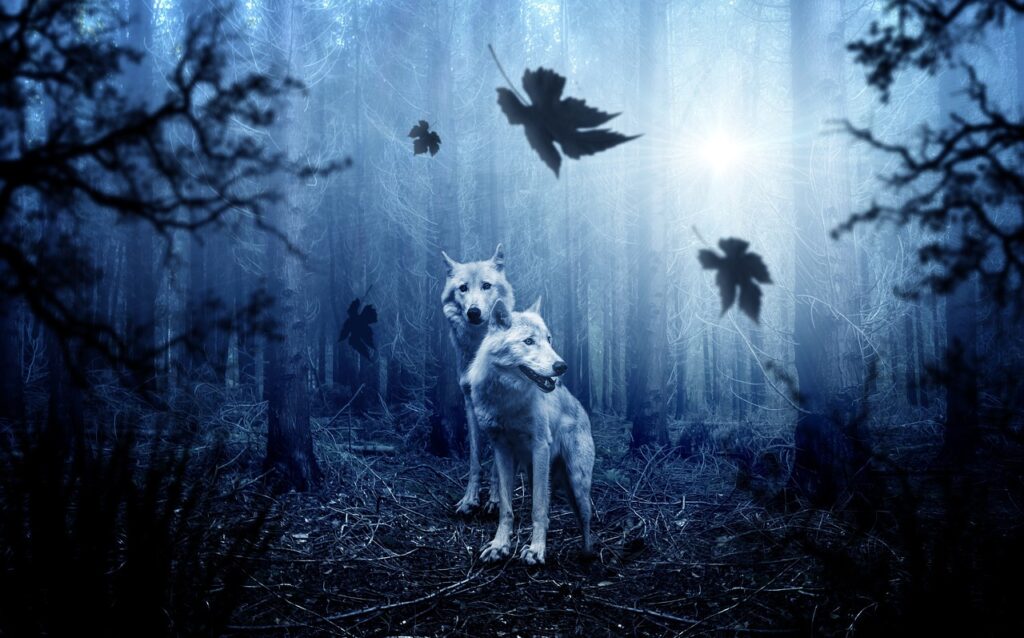The U.S. military is divided into four main divisions:
- The Army
- The Air Force
- The Navy
- The Marines
Ephesians 6:12 breaks down Satan’s kingdom into four different ranks:
- Principalities
- Powers
- Rulers of this dark world
- Spiritual forces of wickedness in the heavenly realms
In the Old Testament, God commands mankind to exercise dominion over four categories of creatures (see Genesis 1:25-28; Leviticus 11:46-47; Psalm 8:6-8; Ezekiel 38:20; Acts 10:12; etc.).
- Beasts of the field
- Birds of the air
- Fish of the sea
- Creeping things
We are commanded to love the Lord our God in four different areas of our identity:
- All our heart
- All our soul
- All our mind
- All our strength
How can these four groupings of four teach us about spiritual warfare?
Birds of the Air:
The Air Force could be compared to the “bird of the air” in that both categories are airborne by definition. When it comes to Satan’s kingdom, Satan is referred to as “the prince of the power of the air” in Ephesians 2:2, and Satan’s kingdom is likened to “the birds of the air” in Mark 4:4, 15. Part of loving the Lord our God with all our mind involves “taking every thought captive to the obedience of Christ” (see 2 Corinthians 10:3-6; Philippians 4:6-8).
According to Rick Warren, “Martin Luther said, ‘You cannot keep birds from flying over your head but you can keep them from building a nest in your hair.’ You can’t keep the Devil from suggesting thoughts, but you can choose not to dwell or act on them.”
― Rick Warren, The Purpose Driven Life: What on Earth Am I Here For? (1)
Beasts of the Field:
Beasts of the field throughout the Old Testament can include animals such as cattle, horses, swine, dogs, sheep, oxen, donkeys, lions, and other four-footed animals, both wild and domesticated. Such ground-dwelling “beasts” could be likened to the Army branch of the military in that both primarily operate “on the ground.”
Oxford Languages defines “field” as follows: 1) “an area of open land, especially one planted with crops or pasture, typically bounded by hedges or fences.” 2) “a particular branch of study or sphere of activity or interest.” Among other definitions, the Merriam-Webster dictionary also defines “field” as “the place where a battle is fought,” as well as “an area or division of an activity, subject, or profession.” (2)
“Field” can be used to describe a person’s occupation. As an old joke goes, “Why did the scarecrow get a promotion? Because he was outstanding in his field.” Particularly when it comes to earlier forms of agriculture, a “beast of the field” would either assist or resist a farmer, shepherd, or rancher.
For instance, an ox would help them to plow their field, whereas a wolf, bear, or lion might threaten their livestock. Spiritually speaking, certain “beasts of the field” can kill or harm you if you are foolish, negligent, ignorant, unarmed, or unprepared to resist them.
An “ox” can serve you so that you can be more successful in reaping results financially or spiritually. I once attended a conference where Roger Hershey used Proverbs 14:4 as an analogy for discipleship: “Where no oxen are, the trough is clean; but much increase comes by the strength of an ox” (NKJV).
Discipleship includes living alongside others and training them to become like Jesus in every area of our lives: spiritual disciplines, work, health, relationships, finances, etc.

Making disciples can be messy, as imperfect people will make many mistakes and bring drama as they learn how to grow up and to get rid of toxic ways of thinking and behaving. Yet deeper relationships with others is necessary if one wants to see results in their lives and to bring more people into the Kingdom of God.
Generally, disciples (or students who are taught by God) are symbolized by sheep; whereas oxen can represent ministers who serve their Master in order to reap a spiritual harvest (see John 10; 1 Corinthians 1:9-14; 1 Timothy 5:17-18).
Some biblical “beasts of the field” may include lions, bears, leopards, wolves, foxes, or any other wild animal in general. What do those beasts of the field represent biblically? Lions often represent kings or leaders (particularly violent ones).
Although Leviticus 11:16 may list “the ostrich” among the various unclean birds, Isaiah 43:20 mentions ostriches alongside “beasts of the field,” which some translations simply call “wild animals.” (3) Even “the serpent” was likened to “the beasts of the field” in Genesis 3:1, 14.
Ostriches can be descriptive of a “spirit of rejection,” an “orphan spirit,” or the state of a person or group who is or who feels abandoned, isolated, rejected, and/or left desolate. (4)
Like lions, bears can also speak of wicked, oppressive people of influence with fierce rage (see Proverbs 28:15; 17:12). Leopards attack with speed and stealthiness. (5) Wolves network together to isolate the vulnerable within a flock for their prey.
Fish of the Sea:
When it comes to “creatures that swarm in the waters,” the Old Testament talks about fish, whales (KJV), and sea serpents. Some Old Testament creatures described as sea serpents include “Leviathan” and “Rahab.” The ancient Philistines worshiped Dagon, an idol who was half-man and half-fish (a merman).
Fish are sometimes used as a biblical metaphor for people or people groups of the world, as reflected in Jesus’ parable of the dragnet and in telling his disciples that they would become “fishers of men” (see Matthew 13:47-50; Mark 1:16-18). This may be also reflected in the modern consolation given in response to a person’s break-up that “There are many fish in the sea.”
When it comes to a military branch, we might compare the “fish of the sea” to the Navy in that both inhabit the waters of the sea. Such creatures who swim beneath the surface could likewise be analogous for the deep secrets, emotions, and innermost desires in the heart of a person.
When it comes to loving the Lord our God with all our hearts, we pour out our hearts before God (see Psalm 62:8). We enjoy an intimate relationship with Him where we openly and honestly disclose the things on our hearts with Him. We ask God to search us, know us, and to reveal anything inside us that doesn’t belong (pride, unforgiveness, bitterness, envy, toxic guilt, shame, fear, control, rebellion, lies, wrong beliefs, etc.) that we need to get rid of (see Psalm 139).
Creeping Things:
The final category of animals is “the creeping things.” According to the animal classifications of Leviticus 11, “creeping things” may include various reptiles, serpents (snakes), scorpions, insects, rodents, and other pests. In my opinion, “creeping things” could be categorized as what the New Testament calls “spirits of infirmity.”
After all, in the animal kingdom, some rodents, insects, and other pests carry various diseases that can be spread to humans. The word “infirmity” can be defined as “sickness” or “weakness,” and we are commanded to love the Lord our God with all our strength.
The U.S. Marine military branch operates on both land and sea. Amphibians are born in water and move to land. Reptiles and amphibians can live on both land and water. In Revelation 16:13-14, three deceptive demonic spirits are compared to frogs.
Jesus gave his disciples authority to trample upon “serpents and scorpions,” when He sent them out on a mission to preach the gospel and heal the sick. After they did so, the disciples reported with joy that demons submitted to them in Jesus’ name. The truth about God’s love and power made the people free from sin, demons, and sickness (see Luke 10:19-20; John 8:32).

The Amplified Classic (AMPC) version of the Bible likens a creature called “Leviathan” to a crocodile in Job 41:1. In some Bible translations, crocodiles are included among the “creeping things” which the Israelites were forbidden to eat in Leviticus 11:29-30. (6)
God identifies Leviathan as “king over all the children of pride” (see Job 41:34). Pride is like a crocodile; it swims in the waters of “De-Nile.” Denial will keep a person in spiritual bondage, keeping them stuck and unable to overcome their struggles.
Jesus cast out a “deaf and mute spirit” from a boy with epileptic symptoms. When His disciples asked him privately why they couldn’t drive the demon out, Jesus replied that it was because of their unbelief and that “this kind does not come out except by prayer and fasting.” (see Matthew 17:19-21).
The psalmist, David, said that “I have humbled my soul with fasting” (see Psalm 35:13). Just as the hot sun and scorching winds may dry up the riverbed in order to drive out the crocodile, so also can pride lose its influence in the life (or soul) of a person who humbles himself with fasting, vulnerable honesty with God, and a conforming to what God says is true and what He requires of us.
A man named Job was afflicted by Satan through traumatic calamity and disease. Beginning in the third chapter of Job’s book, Job cursed himself, invoked Leviathan over his life (see Job 3:8), complained in the bitterness of his soul, wallowed in self-pity, and accused God of unfairly afflicting such a God-fearing and blameless man as himself.
Near the end of the book, God Himself rebukes and corrects Job for his haughty attitude and concludes His court session with an entire chapter devoted to the characteristics and operations of the creature “Leviathan.” In the end, Job received God’s grace, healing and prosperity by taking responsibility for his self-righteousness and repenting.
It became clear that God was not being unfair to him and was not responsible for the bad things that happened to him, as Job had previously thought. Presuming that Job later authored the book of Job, it was only in hindsight that Job discovered that Satan had the legal right and permission to steal, kill and destroy in Job’s life.
Could it be that before the calamity in Job’s life, fear and perfectionism had taken root in Job’s heart and subtly affected his relationships? Job was riddled with worried speculation about his children rather than being at peace with a clear conscience and strong confidence in God.
Job had more in common with fear than with faith in certain areas of his life, and this gave Satan (who does not play nice) a legal right to strike him where it would hurt his weak faith and insecurity the most (see Job 1:4-5; 3:25-26). (7) The bite of a viper, cobra, adder, or asp will cause a person to become deathly sick. The same applies to a scorpion’s sting.
Fear will paralyze a person, produce excess cortisol drip in a person’s bloodstream, compromise their immune system, and manifest (or result) in sickness and disease, even leading to premature death. Toxic guilt will do the same physiologically. Thus, a scorpion can biblically represent a “spirit of fear” or toxic guilt which manifests in sickness, disease, or a “spirit of infirmity.”
How does a person overcome guilt, fear, and the sicknesses that science has increasingly discovered have accompanied those mental states? Jesus died to remove our guilt. Perfect love casts out fear, and God demonstrated his own love for us in that while we were still sinners, Christ died for us (see 1 John 5:18; Romans 5:8).
It is written in Isaiah 53:5 that by [Jesus’] stripes we are healed. The whip with which Jesus was fogged, the Roman “cat-o-nine-tails,” was also called the “scorpion.” Jesus was “whipped with scorpions” so that we could receive freedom from guilt, fear, paralysis, disease, and mental torment.

Serpents represent all kinds of evil and deception–particularly pride and its manifestations of shame, bitterness, envy, etc. A whale (Hebrew tannîn—also translated jackal, sea serpent, or monster) represents death, Sheol, or the grave. A person under the influence of such a “spirit of heaviness” will manifest depression and feel stuck, as in a “pit” or a dark “abyss.” (8)
How does a person exercise dominion over such “wild animals,” “birds of the air,” “fish of the sea,” and “creeping things?”
How can we overcome sins, struggles, bad habits, addictions, pains, diseases, grief, depression, setbacks, darkness, or anything that hinders God’s love or His best plans for us?
See “Knowing the God Who Fights for You” for next steps.
- https://www.goodreads.com/quotes/7381523-martin-luther-said-you-cannot-keep-birds-from-flying-over#:~:text=Martin%20Luther%20said%2C%20%E2%80%9CYou%20cannot%20keep%20birds%20from%20flying%20over,dwell%20or%20act%20on%20them
- https://www.merriam-webster.com/dictionary/field#:~:text=a(1),of%20particular%20objects%20or%20features
- https://www.biblegateway.com/verse/en/Isaiah%2043%3A20
- https://www.stevederenge.com/rejection-is-like-an-ostrich/
- https://sderenge.samcart.com/products/spiritual-leopard-hunting
- https://www.biblegateway.com/verse/en/Leviticus%2011:30
- https://hermeneutics.stackexchange.com/questions/73782/job-15-job-seems-to-be-offering-sacrifices-for-his-childrens-probable-pos Accessed August 14, 2023.
- https://www.stevederenge.com/depression-is-like-a-whale/